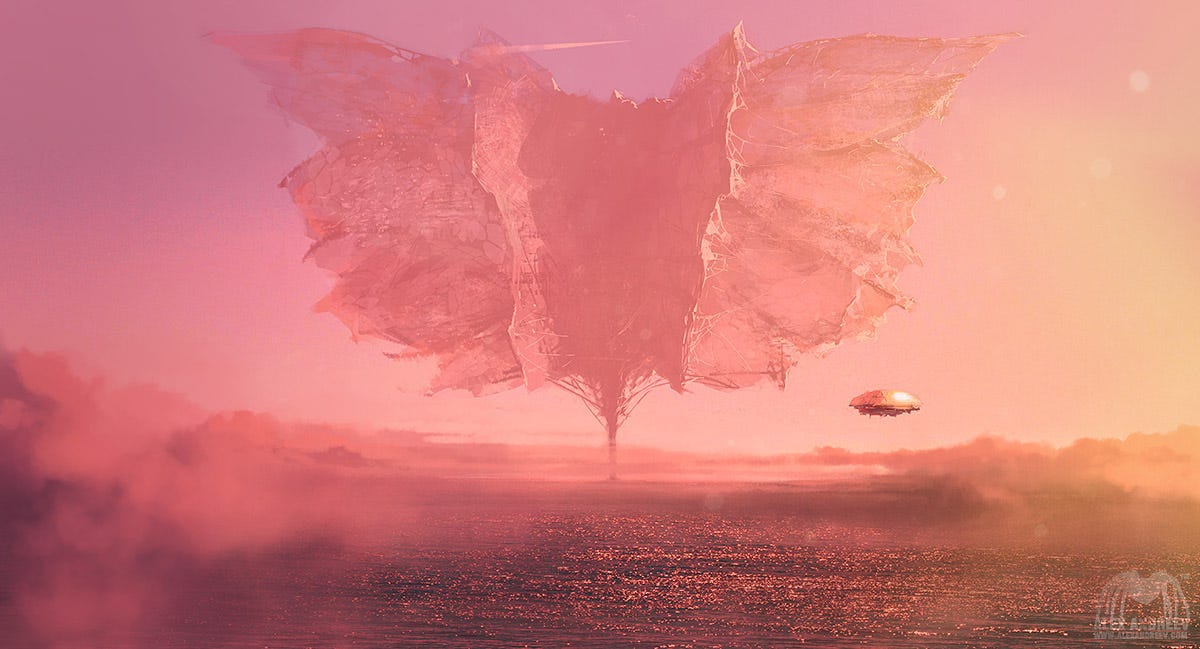International Journal of Solarist Studies
Loneliness, A Phenomenological Reflection

The black waves cresting with white foam as the dark winter afternoon stole the daylight too early filled my heart with dread that I might find myself stranded at sea, bobbing about in the English Channel for hours on end, too rough to dock; a fate that had unfortunately befallen some of the crossings earlier that week due to storm Dennis: a menace indeed. How very appropriate, then, that upon the sea-going portion of my return journey from a home-made writers retreat in Brittany I should find myself reading Solaris; Stanislaw Lem’s masterwork of loneliness and isolation.
Many readers may be familiar with the general outline of Solaris, but the briefest of recaps would state that it is the story of a mysterious planet completely covered by what appears to be a sentient but unfathomable ocean, able to physically manifest in human form the repressed traumas of the crew observing it aboard a floating science-station. The brooding, broiling, blood red ocean represent the depths of the Freudian unconscious. What monsters lurk beneath its surface; rage, jealousy, lust? Likewise, the strange and gigantic ‘Symmetriad’ formations which burst from the ocean’s surface every so often struck me as three dimensional Rorschoch tests.
Lem also recounts in exquisite detail the myriad various theories, schools of thought and key theorists with their own imaginary journals (to which my title is a nod) attempting to explain the meaning of the Solarian ocean. A few days later I experienced an insightful epiphany on this front. While Listening to a fascinating discussion between Professors Davood Gozli and Mark Freeman I realised that the contested ground they covered regarding psychology and the study of the mind itself echoed those of Solaris Studies. Perhaps this was Lem’s point: we ourselves are more complicated than we are able to comprehend.

In Lem’s Solaris, the central character, Kelvin, is visited by the physical incarnation of his long deceased wife. Not only is this re-animation of his long-lost partner an almost unbearable intrusion of the Lacanian ‘traumatic real’ for Kelvin, but, moreover, the repulsion generated by the ocean’s simulcra is due to them having something of the “uncanny valley” about them. Precisely because these apparitions are constructed from the fragmented subconsious remembrances of loved ones, or even hated and feared ones in the cases of the other unfortunate scientists on board the levitating research platform, their knowledge, the way they behave and even their physical appearance is somewhat artificial. The dress Kelvin’s wife wears upon her incarnation, for example, has buttons but no button holes. A more current analogy would be to compare the Solarian automata to the oft-maligned Non-Player Characters of modern day computer games, with their ‘canned’ and limited reactions.
At a deeper level, it appears that what Lem is trying to get at here was the unease and loneliness we might sometimes feel as to whether we truly know our loved ones as well as we hope. Is the persona they present to us really the “real them”.
Indeed, loneliness had pervaded my time in Brittany. I had gone there ostensibly on a writer’s retreat and to do some DIY; however my loneliness seemed only to intensify as my time away to write and work on the cottages came to its end. I couldn’t wait to get home and back to my family. Perhaps I’m becoming a lapsed atheist, but in the town of Carhaix I found myself in a little open chapel I know of, just sitting there alone and hoping that everyone back home was ok. I put some money in the donation box, but I felt lighting a candle might have been a step too far. Later that week I found myself taking succour from nature; on a walk through the woods I stood at the edge of open fields, taking in the silence as a bright but weak winter sun began to set.
Fortunately, my brief sojurn across La Manche turned out to be a smooth one. But if I was trapped on Solaris how might it manifest my deepest fears to me? Would it be in the form of an unending panic attack? I think the term blind panic comes from the feeling that the mind’s eye is so overcome with fear that one cannot think straight. One finds oneself frantically pacing the room with no thoughts, only vision. One feels that the event is so real that there is no way of rationalising it; you can’t think your way out of this, you have to go through it. I wonder if this is a regression to a more animal way of thinking?
As I write this the world is in the grip of the Coronovirus pandemic. Towards the end of Lem’s book Kelvin realises that he does not want to escape from his reincarnated wife on Solaris. Instead of trying to flee he decides to stay. As the Coronovirus pandemic envelopes the world much as the planetary ocean in Solaris, we cannot flee anywhere either. What we can do, however, is to try to do what Kelvin does and face the situation head on; a good place to start with this would be to look out for each other and keep going.
